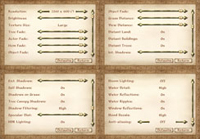
The Elder Scrolls IV: Oblivion
Publisher: 2K GamesWe used the latest addition to the impressive Elder Scrolls series of titles, Elder Scrolls IV: Oblivion with the 1.2 patch applied. It uses the Gamebyro engine and features DirectX 9.0 shaders, the Havok physics engine and Bethesda use SpeedTree for rendering the trees.
The world is made up of trees, stunning landscapes, lush grass and features High Dynamic Range (HDR) lighting and soft shadowing. If you want to learn more about The Elder Scrolls IV: Oblivion, we recommend giving our graphics and gameplay review a read.
The graphics options are hugely comprehensive, with four screens of options available for you to tweak to your heart's content. There is also the configuration file too, but we've kept things as simple as possible by leaving that in its out of the box state. For our testing, we used a two minute section walking through a wooded area, down into a valley. This test scenario features lots of vegetation and trees, and is one of the most intense sections we've found in the game -- especially when anti-aliasing is enabled at the same time as HDR.
The Elder Scrolls IV: Oblivion
1680x1050 4xAA 16xAF, DX9, Maximum Detail
- Nvidia GeForce 8800 GTS 512MB SLI
- XFX GeForce 9800 GX2 600M 1GB
- AMD ATI Radeon HD 3870 X2 1GB
- Nvidia GeForce 8800 Ultra 768MB
-
-
72.0
-
47.0
-
-
-
69.8
-
50.0
-
-
-
65.0
-
42.0
-
-
-
46.8
-
33.0
-
0
10
20
30
40
50
60
70
80
Frames Per Second
-
Average
-
Minimum
The Elder Scrolls IV: Oblivion
1920x1200 0xAA 16xAF, DX9, Maximum Detail
- Nvidia GeForce 8800 GTS 512MB SLI
- AMD ATI Radeon HD 3870 X2 1GB
- XFX GeForce 9800 GX2 600M 1GB
- Nvidia GeForce 8800 Ultra 768MB
-
-
67.6
-
44.0
-
-
-
67.5
-
43.0
-
-
-
66.0
-
44.0
-
-
-
51.7
-
36.0
-
0
10
20
30
40
50
60
70
Frames Per Second
-
Average
-
Minimum
The Elder Scrolls IV: Oblivion
1920x1200 4xAA 16xAF, DX9, Maximum Detail
- Nvidia GeForce 8800 GTS 512MB SLI
- XFX GeForce 9800 GX2 600M 1GB
- AMD ATI Radeon HD 3870 X2 1GB
- Nvidia GeForce 8800 Ultra 768MB
-
-
64.6
-
44.0
-
-
-
64.3
-
44.0
-
-
-
60.3
-
38.0
-
-
-
41.4
-
28.0
-
0
10
20
30
40
50
60
70
Frames Per Second
-
Average
-
Minimum
The Elder Scrolls IV: Oblivion
2560x1600 0xAA 16xAF, DX9, Maximum Detail
- Nvidia GeForce 8800 GTS 512MB SLI
- XFX GeForce 9800 GX2 600M 1GB
- AMD ATI Radeon HD 3870 X2 1GB
- Nvidia GeForce 8800 Ultra 768MB
-
-
65.2
-
44.0
-
-
-
64.5
-
43.0
-
-
-
50.8
-
31.0
-
-
-
36.1
-
24.0
-
0
10
20
30
40
50
60
70
Frames Per Second
-
Average
-
Minimum
The Elder Scrolls IV: Oblivion
2560x1600 4xAA 16xAF, DX9, Maximum Detail
- Nvidia GeForce 8800 GTS 512MB SLI
- XFX GeForce 9800 GX2 600M 1GB
- AMD ATI Radeon HD 3870 X2 1GB
- Nvidia GeForce 8800 Ultra 768MB
-
-
46.9
-
34.0
-
-
-
44.7
-
29.0
-
-
-
40.4
-
26.0
-
-
-
26.9
-
18.0
-
0
10
20
30
40
50
Frames Per Second
-
Average
-
Minimum
Oblivion tells a slightly different tale to some of the other games, as the Radeon HD 3870 X2 performs well almost right the way across the board, while the GeForce 8800 GTS 512MB configuration is also faster than Nvidia's new flagship product. That said, in a real-world gaming scenario, you're going to be pushed to notice a difference in performance between the GeForce 9800 GX2 and the 8800 GTS 512MB SLI configurations – the differences are small at best.










Want to comment? Please log in.